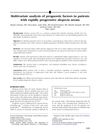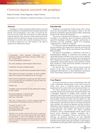 November 2024 in “Health Science Reports”
November 2024 in “Health Science Reports” Light/laser therapy can effectively increase hair density in some types of alopecia, especially androgenic alopecia and alopecia areata.
 26 citations,
September 2012 in “Journal of The American Academy of Dermatology”
26 citations,
September 2012 in “Journal of The American Academy of Dermatology” Patients with rapidly progressive alopecia areata often have a better outlook and shorter disease duration, with regrown fine hairs and no past alopecia being positive signs.
 67 citations,
February 2009 in “Journal of Dermatology”
67 citations,
February 2009 in “Journal of Dermatology”  1 citations,
July 2023 in “Al-Azhar Medical Journal”
1 citations,
July 2023 in “Al-Azhar Medical Journal” Higher antigliadin antibodies are linked to more severe alopecia areata, suggesting screening for celiac disease in these patients.
 226 citations,
September 2001 in “Journal of The American Academy of Dermatology”
226 citations,
September 2001 in “Journal of The American Academy of Dermatology” Hair loss in women is genetic, diagnosed by examination and biopsy, and treated with minoxidil, finasteride, or transplantation.
19 citations,
March 2013 in “Headache The Journal of Head and Face Pain” A woman's headache and hair loss were relieved by Botox injections.
January 2022 in “Clinical Cases in Dermatology” Early treatment of traction alopecia can reverse hair loss; prevention involves avoiding tight hairstyles.
March 2023 in “Nigerian Journal of Clinical Practice” The main difference in hair loss for lupus patients is smaller and fewer sebaceous glands.
 28 citations,
December 2013 in “British Journal of Oral & Maxillofacial Surgery”
28 citations,
December 2013 in “British Journal of Oral & Maxillofacial Surgery” The document concludes that understanding the anatomical changes of the ageing face is important for effective rejuvenation treatments.
 58 citations,
September 2012 in “Dermatologic Clinics”
58 citations,
September 2012 in “Dermatologic Clinics” Male pattern hair loss caused by follicular miniaturization; early diagnosis and treatment can reduce psychological burden.
 74 citations,
April 2005 in “Dermatologic Clinics”
74 citations,
April 2005 in “Dermatologic Clinics” Minoxidil and finasteride are effective for male hair loss, minoxidil for female hair loss, and various treatments like corticosteroids work for alopecia areata; treatment should be tailored to the individual.

Different genes cause Female Pattern Hair Loss compared to male hair loss, and treatments vary, but more research is needed to understand it fully.
 September 2003 in “Current Paediatrics”
September 2003 in “Current Paediatrics” The document concludes that accurate diagnosis and understanding the type of hair disorder are crucial for treating hair loss in children.
 July 2018 in “Elsevier eBooks”
July 2018 in “Elsevier eBooks” Scalp psoriasis can cause different types of hair loss, with some patients developing permanent hair loss, and treatment may be stopped due to skin reactions.
 41 citations,
July 2015 in “Clinical and Experimental Dermatology”
41 citations,
July 2015 in “Clinical and Experimental Dermatology” Psoriasis can cause temporary or permanent hair loss.
 6 citations,
June 2018 in “PLOS ONE”
6 citations,
June 2018 in “PLOS ONE” The Alopecia Areata Assessment Tool (ALTO) effectively identifies alopecia areata from other hair loss types but needs more validation.
 July 2018 in “Elsevier eBooks”
July 2018 in “Elsevier eBooks” Frontal Fibrosing Alopecia is a type of hair loss affecting mostly older women, with no agreed best treatment.
 64 citations,
November 2008 in “Journal of The American Academy of Dermatology”
64 citations,
November 2008 in “Journal of The American Academy of Dermatology” A new type of rapid hair loss called ADTA usually gets better on its own within 6 months.
 June 2023 in “Dermatology reports”
June 2023 in “Dermatology reports” The link between pemphigus and the patient's scarring hair loss is still unclear.
 30 citations,
September 2020 in “Journal of Patient-Reported Outcomes”
30 citations,
September 2020 in “Journal of Patient-Reported Outcomes” Alopecia Areata (AA) causes significant emotional distress, including feelings of embarrassment, depression, and anxiety, and impacts social interactions and daily activities.
 May 2021 in “Our Dermatology Online”
May 2021 in “Our Dermatology Online” A woman with a rare scalp condition causing a thick scalp and hair loss didn't improve with steroid treatment.
 January 2023 in “International journal of homoeopathic sciences”
January 2023 in “International journal of homoeopathic sciences” Homeopathy helped a 30-year-old man regrow his hair.
 7 citations,
July 1999 in “In Practice”
7 citations,
July 1999 in “In Practice” The conclusion is that a systematic approach is key for treating symmetrical alopecia in dogs, but treatment may not always be necessary.
 2 citations,
September 2021 in “Journal of Pharmacopuncture”
2 citations,
September 2021 in “Journal of Pharmacopuncture” Korean medicine may help with hair growth in alopecia, but more research is needed to confirm this.
 June 2022 in “Indian journal of clinical and experimental opthalmology”
June 2022 in “Indian journal of clinical and experimental opthalmology” The report shows a young man with Hutchinson-Gilford Progeria Syndrome had typical and additional eye problems related to the disease.
 5 citations,
January 2019 in “Skin appendage disorders”
5 citations,
January 2019 in “Skin appendage disorders” The conclusion is that it's important to tell apart alopecia areata from lipedematous alopecia for proper treatment, as alopecia areata can be reversed.
 June 2019 in “Pediatric Dermatology”
June 2019 in “Pediatric Dermatology” Alopecia in patients with epidermolysis bullosa varies in severity and is often caused by skin blistering or trauma.
 42 citations,
July 2014 in “Journal of biological chemistry/The Journal of biological chemistry”
42 citations,
July 2014 in “Journal of biological chemistry/The Journal of biological chemistry” Heparan sulfate is important for hair growth, preventing new hair formation in mature skin, and controlling oil gland development.
 27 citations,
December 2001 in “Clinical and experimental dermatology”
27 citations,
December 2001 in “Clinical and experimental dermatology” Different hair removal methods have pros and cons, and more evidence is needed to prove laser treatments work.
 9 citations,
August 2018 in “Journal der Deutschen Dermatologischen Gesellschaft”
9 citations,
August 2018 in “Journal der Deutschen Dermatologischen Gesellschaft” Most patients with frontal fibrosing alopecia are middle-aged women, often have thyroid disease, and some treatments can help stabilize the condition.


























